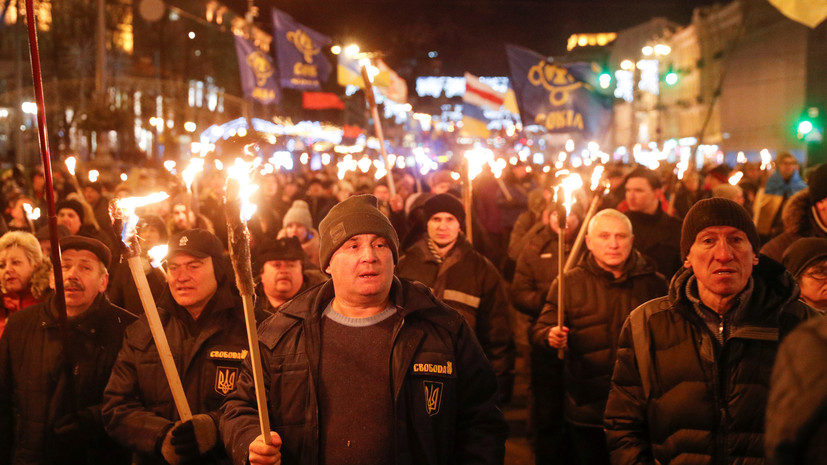The Ukrainian Foreign Ministry reacted to the joint statement of the ambassadors of Israel and Poland in Kiev, which condemned the celebration of the founders of Ukrainian nationalism on the part of Kiev.
The Ukrainian Foreign Ministry announced the right of the state to independently choose their heroes.
“The revival and preservation of the national memory of the Ukrainian people is one of the priority areas of state policy of Ukraine. Each nation and each state independently determines and honors its heroes, ”UNN agency quoted the press secretary of the Ministry of Foreign Affairs of Ukraine, Yekaterina Zelenko.
To gallery page
According to her, Ukraine is aware of the existence of figures, institutions and “even countries” who are interested in “so that the issue of honoring national heroes and important dates will continue to be a matter of contention” between Ukrainians and other peoples.
She expressed the view that the friendship and partnership between Ukraine on the one hand and Poland and Israel on the other, is "the most important asset, the value of which can not be overestimated."
“And we must stand on his guard, to prevent any attempts to provoke tension in bilateral relations, in particular against the background of discrepancies and approaches to historical memory. Civilized nations should proceed from the principle of honoring all the dead, and discussions in this area should continue at the level of historians and experts, not politicians, ”Zelenko said.
Commenting on the reaction of Kiev to the speech of the diplomats of Israel and Poland, the first deputy chairman of the Federation Council committee on international affairs, Vladimir Dzhabarov, doubted that most Ukrainians support Bandera's status as a national hero.
“Bandera became famous for collaborating with the Nazis. And any national hero of any country, if he collaborated with the Nazis, is not worthy of being glorified and remembered. Let the Ukrainian leadership not particularly lean on this topic, because it will not bring honor to them, ”said Dzhabarov.
According to the Director General of the Center for Political Information Aleksey Mukhin, the rhetoric from Ukraine regarding the nationalists of the past will remain the same. He also drew attention to the fact that Ukraine’s western partners do not at least condemn such behavior.
“Our American counterparts are encouraging natsification in every way. At the same time, Europe, under fear and pressure, also takes a rather passive position. Against this background, nationalist forces influence the decisions of the Ukrainian authorities, ”the expert suggested in an interview with RT.
“There is no alternative narrative”
Recall that the ambassadors of Poland and Israel in Kiev previously criticized the honoring in this country of the leaders of the Organization of Ukrainian Nationalists (OUN) and the Ukrainian Insurgent Army (UPA) *.
In a joint statement, the ambassadors expressed concern that government officials at various levels of Ukraine "still celebrate historical events and their figures that need to be condemned once and for all."
Diplomats cited as an example people who, according to the authors of the appeal, “actively promoted ethnic cleansing.” In this list, the ambassadors mentioned the leader of Ukrainian nationalists Stepan Bandera, “Nazi collaborator Andrei Melnyk”, “anti-Semitic and anti-Polish writer” Ivan Lipu and his son Yuri.
The authors of the statement drew attention to the fact that on January 1 a banner with a portrait of Bandera was posted on the building of the Kiev City State Administration. On this day, a torchlight procession took place in the city in honor of the 111th anniversary of the birth of the Ukrainian nationalist, in which about 1 thousand people took part. Similar events that have become traditional in recent years have taken place in some other cities of Ukraine.
In addition, after the coup in 2014, avenues and city streets in Ukraine began to be called the names of Ukrainian nationalists. So, Moscow Avenue in Kiev was named after Bandera, and Vatutin Avenue was renamed in honor of the UPA commander Roman Shukhevych.
Speaking about the reaction of Kiev to the statement of the diplomats of Israel and Poland, the director of the International Institute for Political Expertise Yevgeny Minchenko called Bandera one of the ideological “bonds” of the new Ukrainian state, which they are unlikely to refuse.
“Moreover, all the grievances on the part of Poland and Israel are so timid and insecure that the Ukrainian side has every opportunity to ignore them,” the expert said in an interview with RT.
He drew attention to Zelensky’s less radical approach to such issues, but pointed out the limited number of alternatives that the current president of Ukraine has.
“But he does not have an alternative narrative and he is forced to reckon with what has already been and has been laid down for decades. This discourse was formed in the system of Ukrainian higher education, ”the expert concluded.
* “Ukrainian Insurgent Army” (UPA) is a Ukrainian organization recognized as extremist and banned in Russia (decision of the Supreme Court of the Russian Federation of 11/17/2014).

